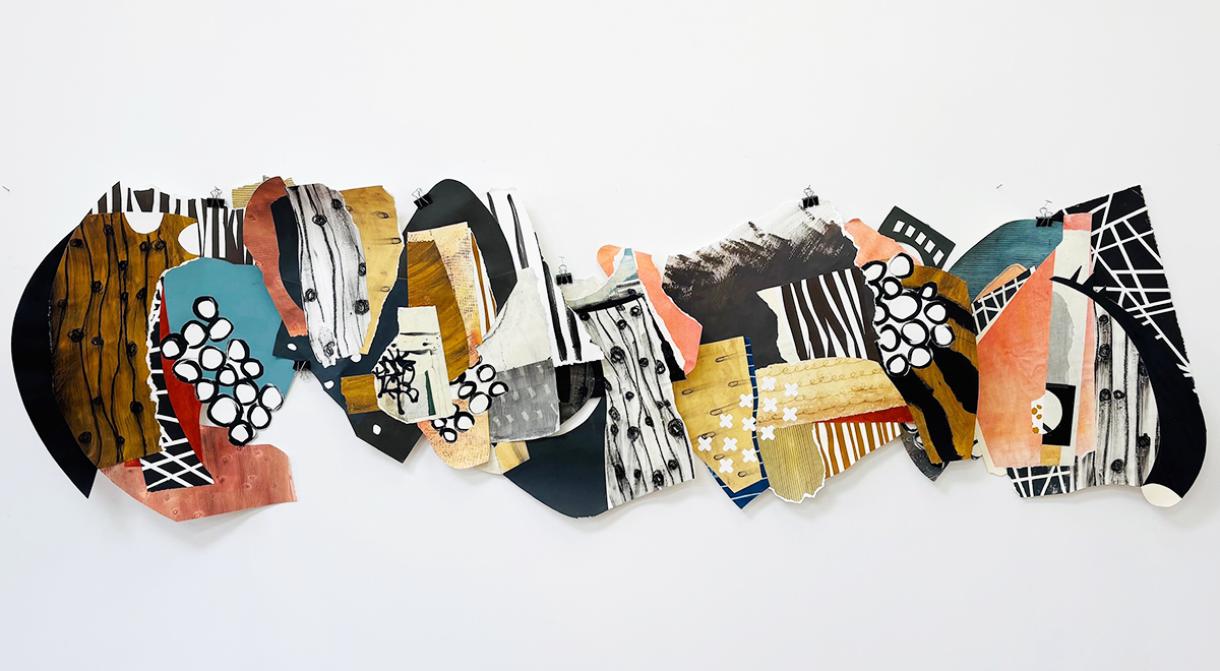Ilze Bebris, Jenny Judge, Coral Patola
–
Opening Reception: Thursday, October 2, 6–8 p.m.
Meet the Artists: Saturday, October 4, 2–3 p.m.
Mandarin tour: Saturday, October 11, 2–3 p.m.
The Ferry Building Gallery is delighted to present Where are we now? a group exhibition that delves into locating the self through the act of creation.
In their sculpture, Coral Patola explores the complexities and intersectionality of their identity: the immigrant culture of Chinese Canadians, the Southeast Asian diaspora of Singapore and Malaysia, and their paternal Ukrainian heritage. Through sculpting and surface decoration, their work becomes a form of escapism inspired by their personal narratives and internal landscapes. Coral proudly identifies as not halves of cultures but a whole, entirely mixed identity.
Jenny Judge’s drawing practice is rooted in a deep sense of place, both as an inner exploration of belonging and not belonging, and the physical response of living between two countries. Her work is inspired by the idea of meeting points: imagined spaces where different worlds touch, merge or overlap. Where the sand meets the sea, where the Northern and Southern Hemispheres appear to touch—these liminal zones are constantly shifting, negotiated both physically and metaphysically, echoing the transient nature of identity and home.
Using collage as a response, Ilze Bebris engages with the fragmented nature of contemporary life. In a world where dominant narratives have unravelled and countless new voices and technologies compete for our attention, we are constantly challenged to navigate an overwhelming influx of information, distraction, and contradiction. This cultural oversupply leaves us feeling scattered, destabilized—perpetually on edge. Collage, with its inherent layering and juxtaposition, becomes a fitting medium for making sense of this disarray. Ilze's collages invite the viewer to pause, reflect, and find moments of balance amid flux, highlighting not only the chaos but also the beauty and resilience within it.
About the artists:
Ilze Bebris is a North Vancouver artist, educator, and occasional curator working in installation, sculpture, and collage. She was born in Toronto and moved to Vancouver to attend university, and then the Emily Carr University of Art + Design, followed by an MFA from the University of Victoria. Much of her works are temporary installations in public spaces and galleries. She is interested in the narratives that shape the culture of contemporary everyday life and how a culture of mass consumption drives our very perceptions and understandings of the world.
Working mainly through a process of bricolage and collage, she creates collages and installations that explore the tensions around ideas of the natural and the artificial, beauty and the abject. She has shown both nationally and internationally and is the recipient of several awards.
Jenny Judge began her formal artistic career in the 1980s, completing a BFA in Sculpture and Printmaking at Queen’s University, followed by a winter session in the Fibre Art Department at the Banff School of Fine Arts. This early foundation sparked a lifelong obsession with experimentation and materials. Over the past 40 years, her practice has evolved into an exploration of installation work that incorporates ceramics, glass, mould-making, film, and writing. Her academic journey includes an MFA from the University of Minnesota and studies in Art Education at the University of British Columbia.
She has participated in numerous residencies and has exhibited her sculpture, drawings, and prints in Canada, the United States, France, Scotland, Ireland, South Korea, Japan, New Zealand, and Australia. Jenny is both Canadian and a New Zealander and is based out of Whistler, BC.
Coral Patola is a POC ceramics artist residing on the unceded land of the Lílwat and St’át’imc Nations (Pemberton, BC). With a BFA and Major in Illustration from Emily Carr University of Art + Design, their work is a blend of utilitarian and sculptural art. Delving into the complexities of their mixed identity, their body of work is an exploration into understanding their personal relationship to gender and place. Patola works from a home studio when not participating in artist residencies.

